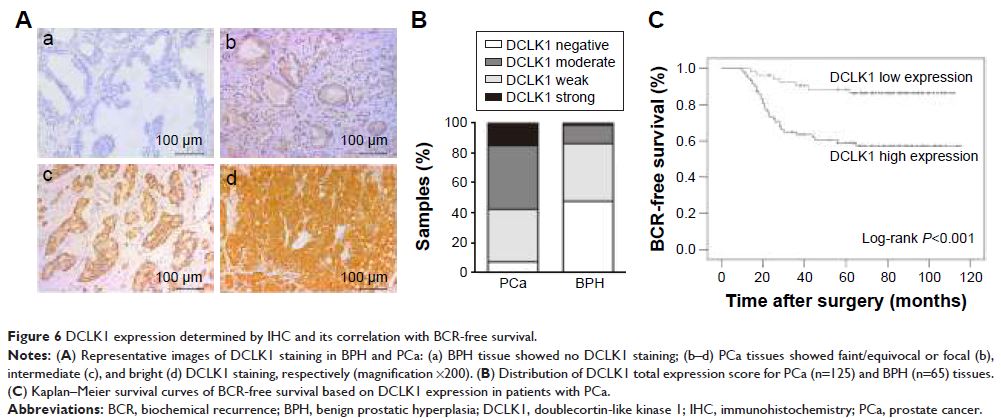9 0 6 7 6
论文已发表
注册即可获取德孚的最新动态
IF 收录期刊
- 2.6 Breast Cancer (Dove Med Press)
- 3.9 Clin Epidemiol
- 3.3 Cancer Manag Res
- 3.9 Infect Drug Resist
- 3.6 Clin Interv Aging
- 4.8 Drug Des Dev Ther
- 2.8 Int J Chronic Obstr
- 8.0 Int J Nanomed
- 2.3 Int J Women's Health
- 3.2 Neuropsych Dis Treat
- 4.0 OncoTargets Ther
- 2.2 Patient Prefer Adher
- 2.8 Ther Clin Risk Manag
- 2.7 J Pain Res
- 3.3 Diabet Metab Synd Ob
- 4.3 Psychol Res Behav Ma
- 3.4 Nat Sci Sleep
- 1.9 Pharmgenomics Pers Med
- 3.5 Risk Manag Healthc Policy
- 4.5 J Inflamm Res
- 2.3 Int J Gen Med
- 4.1 J Hepatocell Carcinoma
- 3.2 J Asthma Allergy
- 2.3 Clin Cosmet Investig Dermatol
- 3.3 J Multidiscip Healthc

双皮质素样激酶 1 在前列腺癌中与肿瘤侵袭性和不良生化复发存活率的关联
Authors Jiang DG, Xiao CT, Xian TZ, Wang LT, Mao YH, Zhang JF, Pang J
Received 19 November 2017
Accepted for publication 4 January 2018
Published 28 February 2018 Volume 2018:11 Pages 1077—1086
DOI https://doi.org/10.2147/OTT.S157295
Checked for plagiarism Yes
Review by Single-blind
Peer reviewers approved by Dr Lucy Goodman
Peer reviewer comments 3
Editor who approved publication: Dr William Cho
Background: Doublecortin-like kinase 1 (DCLK1) has been proven to be involved
in numerous tumors, while its role in prostate cancer (PCa) is still unclear.
This study aimed at investigating the expression pattern and prognostic value
of DCLK1 in PCa.
Patients and
methods: Real-time polymerase chain
reaction and Western blot were employed to determine DCLK1 mRNA and protein
levels in 25 paired fresh samples of PCa and benign prostatic hyperplasia (BPH)
as well as in PCa cell lines. Immunohistochemistry (IHC) was also performed in
125 PCa and 65 BPH tissues to assess DCLK1 expression. Then, the association of
DCLK1 expression with clinicopathological parameters and biochemical recurrence
(BCR) after radical prostatectomy was statistically analyzed. In addition, the
role of DCLK1 in PCa cell proliferation, migration, and invasion was evaluated
by using MTT and transwell assays.
Results: The mRNA and protein levels of DCLK1 were markedly higher in the fresh
samples of PCa than that in BPH. Consistently, IHC revealed increased
expression of DCLK1 in PCa paraffin-embedded tissues compared with BPH.
Moreover, increased DCLK1 expression was significantly associated with
postoperative Gleason grading (P =0.012),
pathological T stage (P =0.001), seminal
vesicle invasion (P =0.026), and lymph node
involvement (P =0.017), respectively. The
Kaplan–Meier curve analysis demonstrated that high DCLK1 expression was
associated with lower postoperative BCR-free survival (bRFS). Furthermore,
multivariate Cox analysis showed that postoperative Gleason grading (P =0.018), pathological T stage (P <0.001), seminal vesicle
invasion (P =0.012), lymph node involvement (P =0.014), and DCLK1 expression (P =0.014) were independent
predictors of BCR. In vitro, the overexpression and knockdown of DCLK1 in PCa
cell lines indicated that DCLK1 could promote cell proliferation, migration,
and invasion.
Conclusion: Increased DCLK1 expression is associated with PCa aggressiveness
and may independently predict poor bRFS in patients with PCa.
Keywords: prostatic neoplasm, DCLK1, BCR, prognosis, radical prostatectomy,
biomarker
